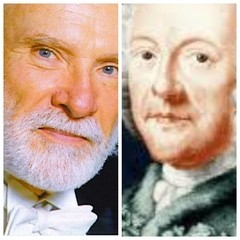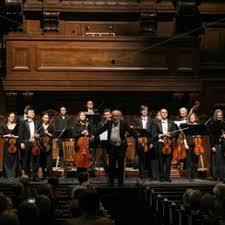|
Back
A Height of Humanity New York
First Church of Christ, Scientist
05/08/2022 -
Georg Philipp Telemann : Polish Dances from Rostock Manuscript, TWV 45 – Quatuor (Concerto Polonoise), TWV 43:B3 – Concerto Polonois, TWV 43:G7 – Sinfonia melodica, TWV50:2 – Sonata Polonese, TWV 42:a8 – Ouverture [composite, “à la Polonaise”]
Early Music New York, Frederick Renz (Director)

F. Renz/G. P. Telemann (© Early Music New York)
“What is played in Polish taverns will have enough ideas to last a lifetime.”
Georg Philipp Telemann (1681-1767)
A few decades ago, Georg Philipp Telemann was classed by non‑Baroque specialists as a minor writer, one of the spiritual sons (or grandsons) of Johann Sebastian Bach, at the most a P.D.Q. Bach. These days, Telemann is rated a mountain among the valley of early 18th Century composers. Not only for unparalleled fecundity (he was supposed to have written a different piece for each day of his nine decades on earth) but an eclecticism which far surpassed his contemporary Bach.
Where the latter shut himself up in a room with organ and clavier–the origin of the words “Bach’s Office”–Telemann was obsessionally peripatetic. He roamed through Europe, studying with French, Italian and German composers, he spent time in Poland–a desolate outpost of cultural Europe–soaking up dance tunes from salons to taverns.
(The latter is questionable. Having played accordion in several Polish taverns from Gdynia to Sopot, I never heard a polonaise among the stumbling vodka-besotted customers.)
The difference between Bach and Telemann is obvious. Had they lived 250 years later, Bach would have been Thelonious Monk or Anton Webern–but Telemann would be either Louis Armstrong or Charles Ives.
Bach wrote music with the help of God; Telemann was aided by humankind.
With inspiration, the ensemble Early Music New York last night never attempted Telemann’s ample often pithless concertos. Instead, this splendid group confined themselves to the rare enchanting music animated by the Polish dances he inhaled while working for a Polish noble. And no ensemble could have given such delicious Baroque verisimilitude.
Director Frederick Renz, baton‑less, often allowing the notes to be leaderless, has made the choice of never allowing his music to be antique. Yes, one had to work into the mood of Early Baroque, but after that, all sounded normal. Like a relatively large ensemble playing not only in perfect synch but with a sense of lilt, almost merriment.

Early Music New York (© Benjamin Chasteen)
After a a few seconds of adjustment, the solo processional of Wayne Hankin with a giant bagpipe seemed almost normal, the drone accompanied by open‑string fiddle by Daniel Lee. (Mr. Hankin repeated this later with a miniature bagpipe and virtuoso fingering.) The movement Les Moscovites started with a bassoon solo becoming a quasi‑chaconne for the whole 20‑piece orchestra.
Even the “chamber” music Sonata Polonaise had its quirky side: three strings, the gorgeous theorbo playing of Dusan Balarin, and the subtle harpsichord continuo lines by Dongsok Shin.
I was not meaning to single out these players. As a whole, with two oboes, strings and a few others, Early Music New York swung through the polonaises and sarabandes and bourrées not with the usual aristocratic solemnity but a personal joy.
Handel once said that Telemann could “write an eight‑part motet quicker than I could write a letter.” Others would snicker at his wife cuckolding him almost nightly or relate that he was self‑taught. But this was irrelevant to his unplumbed genius itself.
Early Music outdid themselves here. This was not a Baroque concert. It was sometimes extraordinary music, played with upbeat tempos, with delicacy, and dare I say it for 18th Century German music? less elegance than wit.
Harry Rolnick
|